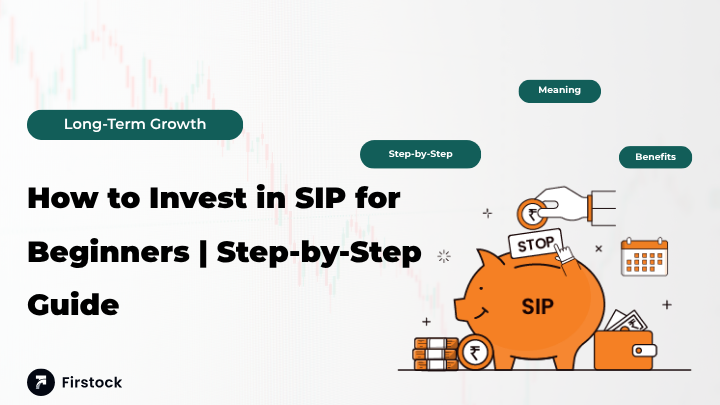How to Invest in SIP for Beginners | Step-by-Step Guide

How to Invest in SIP for Beginners
Investing is no rocket science and if you have ever been perplexed by it, don’t fret, you are not alone. The majority of neophytes while going through the stock market come up with the thought of “This is too complex. What if I lost my money?” This anxiety is quite justified. However, what if it were so that there is an investing method which is not dependent on market predictions, requires no lakhs of rupees and proceeds silently in the background so that you can concentrate on your day?
This is precisely what a Systematic Investment Plan (SIP) is meant to do.
The best word to describe the process is by comparing it with a young tree. You water it bit by bit every week. At the very beginning, it is quite small and practically unnoticeable. But after a couple of years, it will become the tree with fruits, shade, and fresh air that you could share with the others. SIPs are exactly like that—small amounts of money turned regular will get you to a point where the small contributions will have grown to a sizeable one.
Comments on the question how to invest in SIP for beginners teaching basic student concept jargons and so on.
Meaning of SIP Investment (Simplified)
Let us gradually proceed to the main question. What is the meaning of sip investment meaning?
SIP is the short form of Systematic Investment Plan. It is not a separate product, it is just a different way of investing in mutual funds. Rather than investing in a large amount, one can invest in a fixed amount per month—₹500, ₹1,000, or whatever fits in his/her pocket.
Here is a straightforward example to explain it:
Say you want to purchase a smart phone worth of ₹60,000. You can do that with one full payment or you can split the amount into manageable EMIs and pay off the phone every month. SIP works the same EMI fashion, but instead of wasting money, you become rich.
SIP Investment Full Form
Since this is one of the most searched terms “sip investment full form” let’s address it right here and now the correct full form of SIP.
SIP = Systematic Investment Plan
It is just a method of investing in mutual funds on a regular basis that is systematic and disciplined.
Nothing spectacular, nothing fearful.
Is Investment in SIP Good or Bad?
Most likely the first question that occurs to you is, "Is it good or bad to investment in SIP is good or bad?"
Let me tell you the truth the whole truth and nothing but the truth: SIPs are good for most of the beginners and they are not myth.
Why SIPs are Good
- Start Small: You can start off with ₹500 each month—which is even less than the cost of a Netflix subscription.
- Develops a money habit: Daily morning walks have to be repeated as far as doing so becomes a habit. SIPs provide the same as they compel their investors to invest regularly.
- Market volatilities do not become opponent for you: Regular investing helps you in having a money average.
- The magic of keeping your money together compound: The money that you have will generate returns, and the returns will get you more returns.
- Adjustable: At any instance, you may decide to temporarily halt your contributions, increase the amount or completely stop.
⚠️ Why SIPs May Feel Bad
First of all, they will not make you wealthy in just a few days. Market conditions influence the returns - at times, they may appear quite low. Grin and bear it (think 5-10 years, not 5 months).
So, to answer the question directly: is it good or bad to investment in SIP is good or bad?
If you are determined to remain calm and give it a try, then it would be good.
How to Invest in SIP for Beginners (Step-by-Step)
We are now moving towards a more practical aspect of the subject. Here is a step-by-step guide on how to invest in SIP for beginners.
1. Know Your Why
Begin by asking yourself: Why would I invest?
- Is it for a comfortable retirement?
- The purchase of a new house?
- The education of your children?
- Or simply to create a fortune?
The "why" of you will be the base of the mutual fund you choose.
2. Learn About Mutual Funds
Since SIPs are merely a vehicle for mutual fund investments, you might as well consider the following:
- Equity Funds: Risky but good for long-term wealth.
- Debt Funds: Less risky but with low returns.
- Hybrid Funds: The mixture of both.
3. Decide Your Budget
Don't be in a hurry to start with a large amount. Even ₹500 per month is sufficient. Keep in mind that when it comes to SIPs, consistency is more important than size.
4. Pick a Fund
Assess:
- The fund's past performance.
- The expertise of the manager.
- Expense ratio (how much they charge for managing your money).
5. Do Your KYC
A simple and quick process done only once- identity details, PAN, and bank details submission.
6. Automate It
Turn on auto-debit. This means that your SIP will be running even without you getting a prompt, just like a subscription that increases your money instead of utilizing it.
How to Invest in SIP Without Broker
Another very common question is, "how to invest in SIP without broker?"
The truth is you don’t require a middleman anymore. Moreover, the process without him is easier (and cheaper).
Ways to do it:
- Invest directly through a mutual fund house (like HDFC, ICICI, SBI).
- Use trusted apps: Groww, Zerodha, Paytm Money, ET Money.
- Even banks let you invest in SIPs directly.
It is important to mention that this means that you are completely in charge—there is no extra charge for unnecessary fees or the dependence on brokers.
The Power of Starting Early (Story Time)
I want to talk about the story of two friends: Ramesh and Suresh.
- Ramesh 25 years old begins a ₹3,000 per month SIP. He stays invested for 30 years.
- Suresh 35 years old, starts the same ₹3,000 per month SIP but he’s 10 years late.
At 12% returns:
- Ramesh gets about ₹1.05 crore as the result.
- Suresh ends up with around ₹35 lakhs.
They both invested the same amount on a monthly basis. However, Ramesh’s 10-year head start gave him nearly 3 times more the money.
👉 Moral: With SIPs, time matters more than timing.
Compounding: Your Wealth Snowball
Compounding is the magic that happens with SIPs.
Imagine rolling a little snowball down a hill. At the beginning, it is very small. But as it rolls, it collects more snow, it becomes bigger and faster. That is how compounding goes—your money makes returns, and those returns make more returns.
That is the reason why being early is so powerful. Even little SIPs can become lakhs and crores over time.
Busting SIP Myths
To begin with, let’s identify the lies that the new comers to SIP world believe about them:
- Myth 1: "SIP is a kind of mutual fund." ❌ No - it is simply an investment plan in mutual funds.
- Myth 2: "The amount of money needed for the start is very big." ❌ It is not the truth. ₹500 monthly is enough.
- Myth 3: "SIP provides fixed returns." ❌ The returns vary based on the market. However, long-term investors are likely to succeed.
- Myth 4: "I need a broker to invest in SIP." ❌ Not at all. You can invest straight away.
Some Tips for Beginners
- Start small but start early.
- Review the status of your SIPs annually.
- Don’t panic if the market falls - that’s when your SIP is buying more units at a lower price.
- Match your SIPs with your life goals (retirement, house, children’s education).
Ending an Era
We didn’t only talk about sip investment meaning, to whether investment in SIP is good or bad, to even the how to invest in SIP without broker, but…
To sum up:
SIP = Systematic Investment Plan, the easiest money-making method.
It’s flexible, very beginner-friendly, and encourages financial discipline.
The earlier you start, the bigger your long-term gains.
If you are asking the question of, "how to invest in SIP for beginners", answer—today is the best time of the day to commence your first one. ₹500 a month is more than enough to start the journey of wealth creation.
👉 One important thing to have in mind is that investing is not about the amount of money but the time + consistency. So, don’t be shy, start today and watch your money tree grow.
Also Read : How to Learn Trading for Beginners | 5 Easy Ways
FAQs on SIP Investment
1.Is SIP better than lump sum?
New investors should start with SIP. Yes, it is true.
2.Can SIPs beat inflation?
Equity-based SIPs should be the first choice if your goal is to beat inflation over time.
3.Can I stop SIP anytime?
Stop whenever you want, there is no restriction.
4.Do I need a demat account?
No. Two things suffice – KYC and a bank account.
5.How long should I keep my SIP?
5–10 years is the ideal tenure.
6.What if I miss one month?
One month missed is nothing, the SIP will continue the next month.





